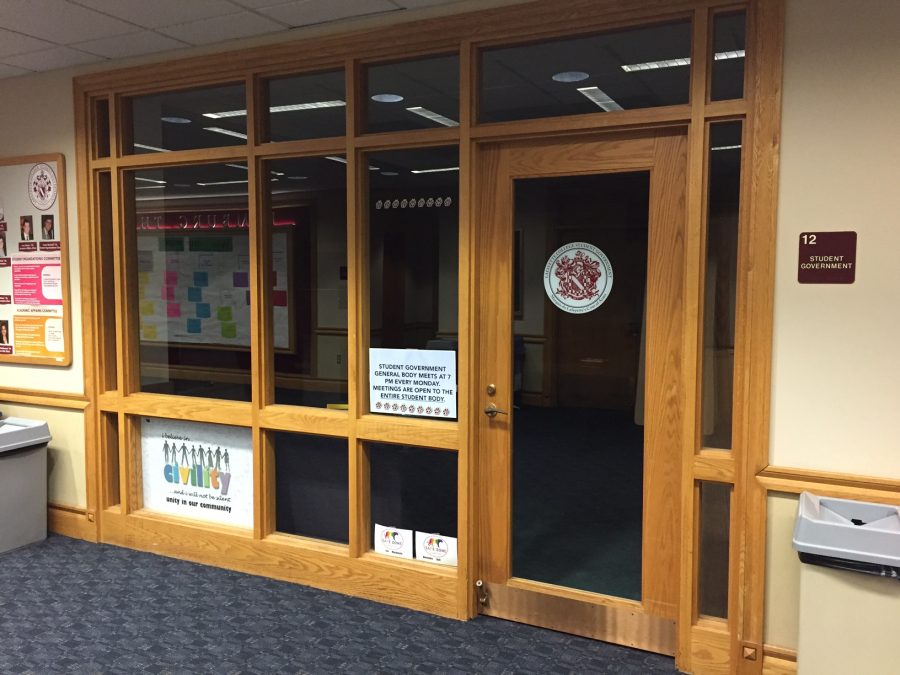Partly as a result of concerns brought to him by conservative students who feel marginalized on campus, Lafayette College Student Government President Bilal Akbar ’18 motioned to form the Ad Hoc Committee on Ensuring Inclusive Dialogue in a meeting on March 8.
Akbar said the committee will hopefully be made up of five to seven students and may “lean conservative,” depending on the applications received. He sent a campus-wide email to begin collecting applications on March 20.
“[The committee] would have a mandate of three weeks from the formation…so they can meet as many times as they like, meet with whoever they like,” he said, “but ideally really by the end of the academic year I want to be able to report on their recommendations and how the administration is going to work on those recommendations moving forward.”
Akbar said one of his goals in forming the committee is to create a space for conservative students and also anyone who feels somehow politically marginalized.
“What I’m working towards is to see more events or more student organizations that break the monotony of the relatively liberal discussion we see on campus,” he said.
Jovante Anderson ’18 seconded Akbar’s motion to form the committee, which was all that was needed to approve the idea. Anderson said he has concerns about students “conflating conservatism with bigotry.” As the chair of intercultural affairs, however, he said he feels the need to ensure that all students can be heard.
“I’m very cautious of students who want to use or tend sometimes to use conservatism in a way that is inconsistent with its original purpose,” he said. “I’m very concerned about that, but I’m very open and willing to speak to students who identify as conservative.”
Anderson said he hopes to see an equal dispersion of political views in members of the future committee.
“I really want to hear what [conservative students’] opinions are, how they feel marginalized on campus, how they feel their voices either in a classroom or in a social setting, where they feel that they’re not being heard,” he added. He wants to find ways to help conservative students express themselves in “respectful ways.”
Anderson warned against using the labels of liberal and conservative to describe people who may not actually subscribe to those views.
Students who are marginalized in regards to race, sexuality or gender and who voice concerns about changes they want to see on campus may be labeled as liberal when they are not necessarily, he said. People who practice bigotry may call their views conservative when that is not the case, he added.
“When we were thinking of forming the committee, one of the things I was thinking of and think it’s important that we understand as a campus is that the dichotomy between liberalism and conservatism is destructive and dehumanizing,” he said.
Akbar said he sees a tendency among students and in the faculty to lean liberal and shun conservative views.
“My personal opinion on this is that there is a slight tendency on the part of the faculty, as well as a majority of the student body, that admittedly is more on the liberal side to shun or silence or marginalize students who identify as conservative,” he said. He noted that it is the ad hoc committee’s ultimate opinion and report that will matter going forward, not his personal view.
Secretary of student government Connor Burwell ’19 wrote in an email that he is skeptical of the committee’s potential effectiveness.
“I am not sure about what it means for a conservative student to feel silenced, nor do I think that the ad-hoc committee may be particularly effective at either clarifying what that means or at “bridging the gap” between conservative students who feel silenced and the rest of the community,” he wrote.
In an email to the student body announcing the formation of the committee, Akbar included a link to a survey in which students can tell the future ad hoc committee about how they feel their political views are treated on campus. He acknowledged that the survey may have a conservative leaning, because it is self-selective, and so it may not be representative of the student body as a whole.
“[The responses have been] mostly conservative students who feel the need to take the survey and express some of their concerns and expectations of the committee and of student government,” he said. “Some of the comments I was reading today were very much in line with what I’ve heard and seen from others who frankly aren’t comfortable expressing their political opinions, and some of them were particularly poignant.”
He described one response he read in which a student did not want to reveal his conservative political views to his friends for fear of condemnation and judgment.
“Anything short of what threatens our college’s values of respect for one another and acknowledgement of each other’s dignity and right to be whoever they are, anything short of that I think is open to debate and discussion, and, unfortunately, I think that is not happening right now,” Akbar said.





















































































































